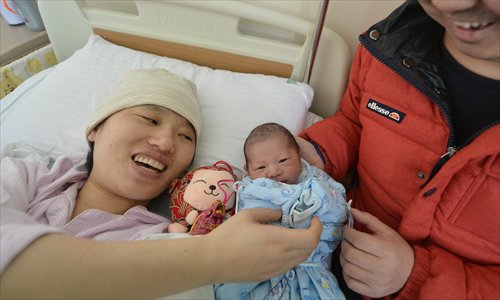HOME >> CHINA
Superstition, two-child policy set to drive up birth rate in 2016
By Ding Xuezhen Source:Global Times Published: 2016-2-15 20:28:02

A mother holds her baby in the Shanghai First Maternity and Infant Hospital on February 8. The baby was the first "monkey baby" born at the hospital. Photo: CFP
Regardless of the government's persistent anti-superstition endeavors, the fact seems to be that superstitious beliefs are here to stay.
A white-collar worker surnamed Zhang in Beijing, who is now preparing for her pregnancy, chose not to have a baby in 2015, the Year of the Sheep, as "in Chinese folklore, babies born in the Year of the Sheep are more likely to lead a rough life."
An official of the National Health and Family Planning Commission (NHFPC) quoted statistics released by the National Bureau of Statistics (NBS) in early January as saying that the number of births nationwide decreased by about 320,000 to 16.55 million in 2015 compared to the previous year.
China's newborn population in 2014 was 16.87 million, an increase of 470,000 compared with 2013, the People's Daily reported in February 2015.
The country's newborn population was previously predicted to rise to 18 million in 2015 after more couples were permitted to have a second child with the gradual lifting of the one-child policy that started in November 2013, according to a 2015 People's Daily report.
Zodiac sign preferences and the decrease in the number of women of childbearing age are the two main reasons for the drop in China's newborn population in 2015, the top family planning authority explained.
Cultural factors
Superstitions related to the zodiac extend beyond childhood and into adulthood.
Zhang used her cousin as an example, saying that "he was once cold-shouldered by his girlfriend's parents because he was born in 1991 - the Year of the Sheep. They worried that he might bring bad fortune to the family."
According to NBS statistics the number of pregnant women started to dramatically rise in July 2015, as these women would give birth in the Year of the Monkey instead of the Year of the Sheep, the NHFPC official explained, noting that the country will see growth in the newborn population in 2016.
Experts echoed the view of the authorities, admitting that cultural factors partially accounted for the decline in the number of babies born in 2015.
"The number of births dropped sharply from March 2015, the beginning of the Year of the Sheep, and remained at a low level throughout the lunar year," Zhai Zhenwu, chairman of the standing council of the China Population Association, an academic community of population studies under NHFPC, told the Global Times.
"Cultural factors are playing an increasingly important role in recent years," Zhai said, noting that the phenomenon was more prominent in the north than in the south.
Such marked changes in demographics due to people's "unscientific cultural views" may lead to a waste of social resources, including education, health care and transportation, said Ma Li, an expert on population.
"If the population sees a big increase in a certain period of time, more public services have to be built, which will become idle in the future when population growth slows down," Ma said.
Monkey baby boom
A new round of baby boom is arriving in the Year of the Monkey as hospitals are making preparations and obstetricians seeing more mothers-to-be.
In January, Beijing Obstetrics and Gynecology Hospital started enlarging its emergency ward by 30 percent, providing more beds in the newborn intensive care unit and hiring more nurses to handle the expected baby boom, the Beijing Morning Post reported. "The increase in the number of visits was obvious," Wang Xin, a chief obstetrician of the Beijing Obstetrics and Gynecology Hospital, confirmed with the Global Times.
"We began to see an increasing number of patients in the second half of 2015. In January, the number of patients almost doubled in January 2016," Wang continued. "Each working day, I see almost a total of 60 or 70 outpatients each morning."
"In the following five years, the number of births each year is expected to increase by 4 or 5 million to nearly 20 or 21 million," Ma said.
The expert said population growth will regain momentum in 2016 due to the easing of family planning policies in the Year of the Sheep as well as the currently adopted two-child policy, which allows all couples to have two children.
Newspaper headline: Mothers of monkeys
Posted in: Society